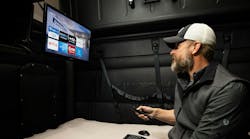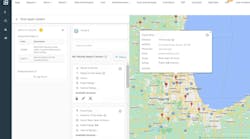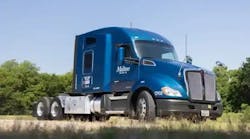New specs boost safety, cut costs for propane service fleet
Manager: Len Strazza
Title: Manager - national fleet operations
Fleet: AmeriGas, Valley Forge, PA
Operation: Residential/commercial propane supplier
PROBLEM
A truck equipped with a crane for installing 500- to 1,000-gal. aboveground steel propane tanks has to be tough enough to handle all that weight over years of service, yet be affordable, too. Amerigas's Len Strazza adds a third caveat: It's got to be a “safe” truck, by which he means fitted with safety devices to protect not only the health and welfare of work crews, but also the general public.
“For example, we wanted to make sure you couldn't engage the PTO without the wheel chocks down; not be able to shift into drive if the crane isn't stowed and secure; and have overload protection to prevent the vehicle from being flipped over,” Strazza says. “We put in a lot of checks and balances that wouldn't let the operator engage the crane or drive the truck unless all the safety procedures were followed to the letter.”
Yet AmeriGas also wanted to save money — and not just by simply shaving dollars and cents off a sticker price. “First, we figured that by improving safety controls on the vehicle, we'd reduce a lot of damage and downtime due to equipment abuse,” Strazza notes. “We expected that would not only lower our maintenance costs, but also give us better warranty coverage from the manufacturer.”
SOLUTION
Strazza began developing AmeriGas's new service-truck spec by first culling its truck chassis, body and component suppliers from 25 down to around 13. Then, starting in October 2003, he began working with those suppliers to put together a truck spec incorporating all of the capabilities and safety features AmeriGas needed.
Chassis makers International Truck & Engine Co. and Ford Motor Co. worked with other suppliers, such as crane manufacturer Iowa Mold Tooling (IMT).
Though improving worker and vehicle safety drove AmeriGas' design efforts, Strazza made sure cost savings was part of the game plan.
Even driver and technician training came into the picture to help reduce the overall life-cycle cost of the vehicle, says Mark Whaley, vp-sales & marketing for IMT. “We helped develop an in-service video that includes segments on DOT compliance, crane and operator safety, and the need to follow routine maintenance procedures,” he notes.
By August 2004, AmeriGas had put 12 prototypes of the new service truck into operation and found it worked just as they planned. Now it's slating the rest of its fleet of 500 service and tank trucks to be replaced by equipment developed along the same lines.
“The foremost goal we had in developing this new truck spec revolved around the safety of our employees, the customer and the general public. Safety came before everything else,” Strazza says.
“But once we satisfied the safety question, we felt we could use that solution to help us on the cost side of the equation,” he adds. “We could negotiate better warranties and supplier deals because the safeguards we'd built into the truck would improve its longevity and lower its life-cycle cost. That's how our safety focus had a cost-saving ripple effect as well.”
Maintenance Bay presents case studies detailing how fleets resolve maintenance-related issues.


